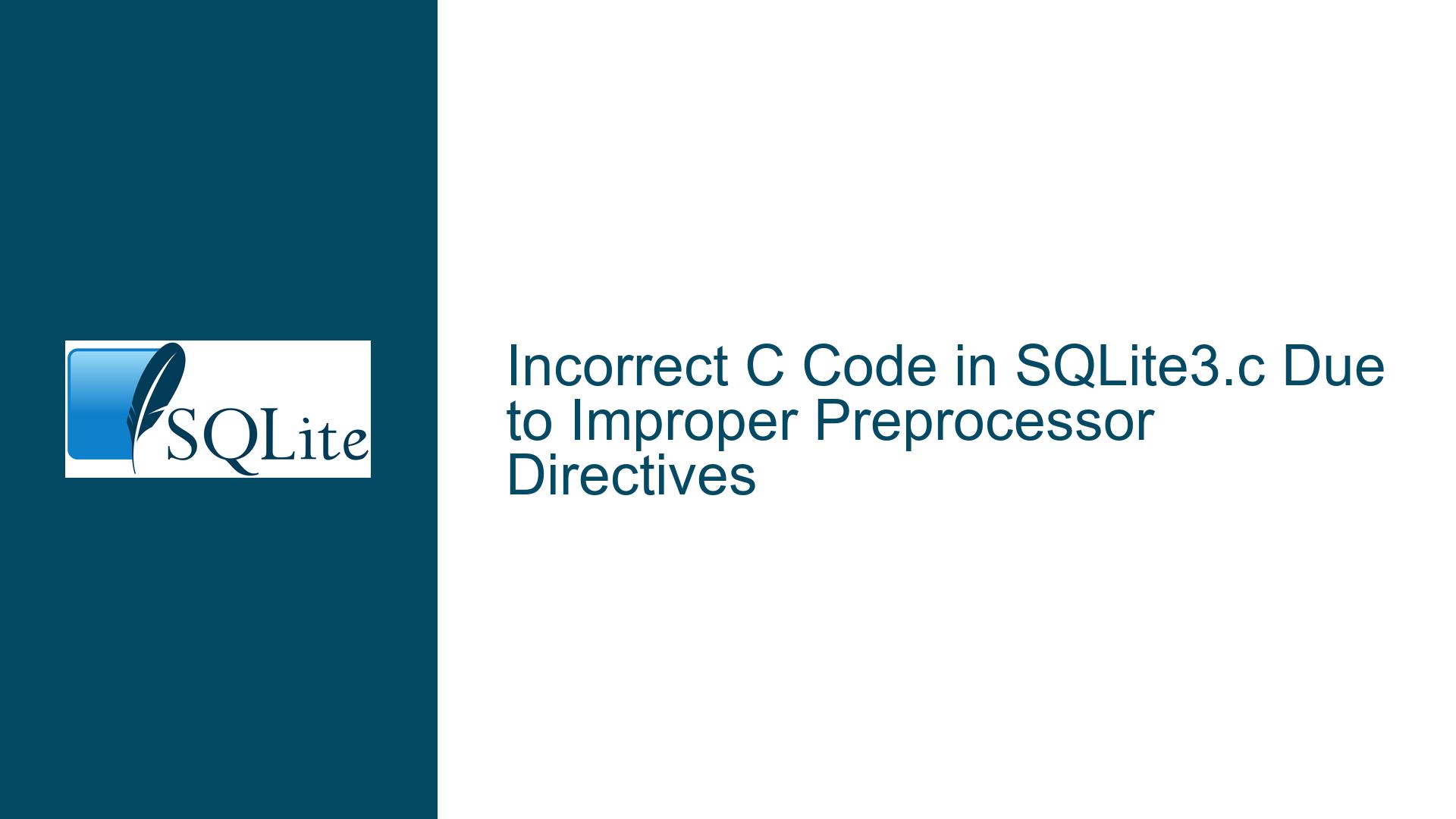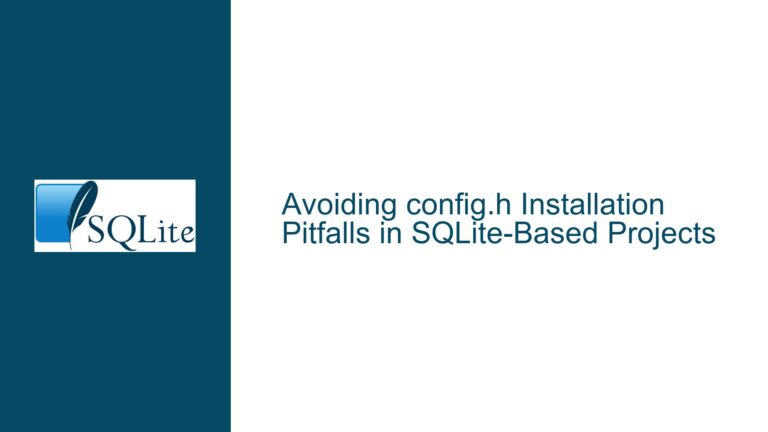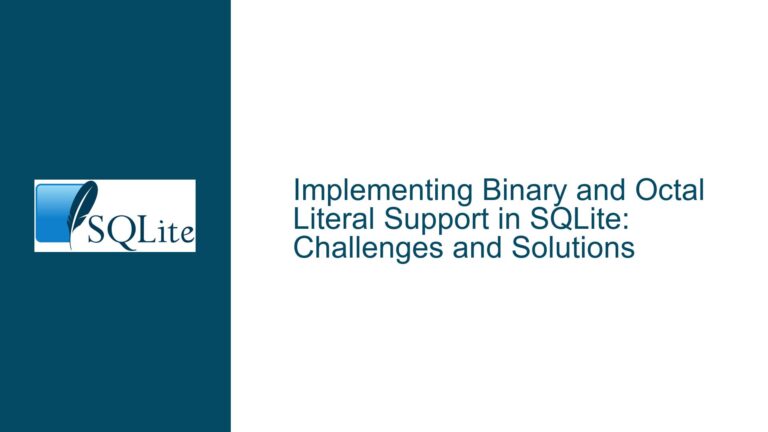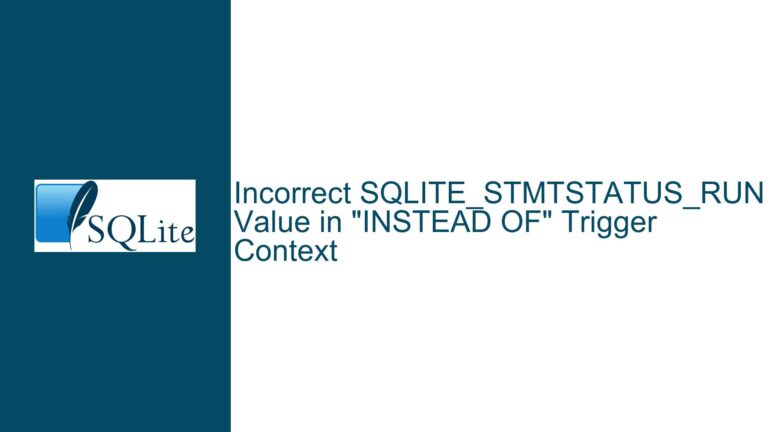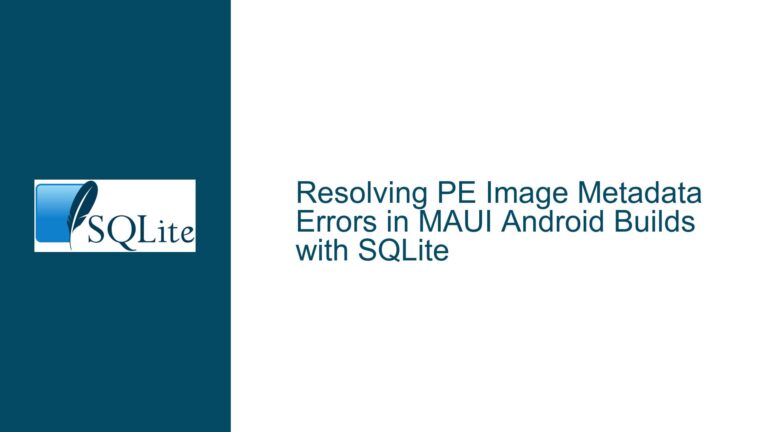Incorrect C Code in SQLite3.c Due to Improper Preprocessor Directives
SQLite3.c Preprocessor Directive Misuse Leading to Invalid C Code
The issue at hand revolves around the misuse of preprocessor directives in the SQLite3.c file, specifically within the SQLite-autoconf-3320000 version. The problematic code segments involve the use of #if instead of #ifdef for conditional compilation, particularly when dealing with empty defines. This misuse results in invalid C code, which can cause compilation errors or issues when generating documentation using tools like Doxygen. The affected lines include directives such as #if SQLITE_MUTEX_PTHREADS, #if SQLITE_NOINLINE, #if SQLITE_MUTEX_W32, and #if SQLITE_MUTEX_NOOP. These directives are used to conditionally include or exclude code based on whether certain macros are defined. However, the current implementation assumes that these macros will have a value, which is not always the case, especially when they are defined as empty.
The core of the problem lies in the fact that #if evaluates the expression that follows it, and if the macro is defined but empty, the expression evaluates to false, leading to the exclusion of code that might be necessary. This is particularly problematic when the macros are defined without a value, as seen in lines 16509 and 13514 of the SQLite3.c file, where #define SQLITE_MUTEX_PTHREADS and #define SQLITE_NOINLINE are defined without any accompanying value. This results in the #if directive treating these macros as undefined or false, which is not the intended behavior.
Empty Macro Definitions and Conditional Compilation Errors
The primary cause of the issue is the improper handling of empty macro definitions in conjunction with the #if directive. In C, the #if directive evaluates the expression that follows it, and if the expression evaluates to zero, the code within the #if block is excluded. When a macro is defined but has no value, the #if directive treats it as if it were undefined, leading to the exclusion of code that should otherwise be included. This is particularly problematic in the context of SQLite3.c, where macros like SQLITE_MUTEX_PTHREADS, SQLITE_NOINLINE, SQLITE_MUTEX_W32, and SQLITE_MUTEX_NOOP are defined without values.
The issue is further compounded by the fact that the #else directive is used in conjunction with these #if directives, as seen in the code snippet where #else is followed by #define SQLITE_MUTEX_PTHREADS. This creates a situation where the macro is defined only if the #if condition evaluates to false, which is not the intended behavior. The correct approach would be to use #ifdef or #if defined() to check for the existence of the macro, rather than its value. This ensures that the code within the #ifdef block is included if the macro is defined, regardless of whether it has a value or not.
Another contributing factor is the use of tools like Doxygen for generating documentation. Doxygen, like many other documentation generators, relies on the preprocessor to parse the source code and extract relevant information. When the preprocessor encounters invalid or ambiguous directives, it may generate errors or produce incorrect documentation. In this case, the misuse of #if directives with empty macros leads to errors in the Doxygen output, highlighting the need for a more robust approach to conditional compilation.
Replacing #if with #ifdef and Ensuring Proper Macro Definitions
To resolve the issue, the first step is to replace all instances of #if with #ifdef or #if defined() where the intention is to check for the existence of a macro rather than its value. This ensures that the code within the #ifdef block is included if the macro is defined, regardless of whether it has a value or not. For example, the code #if SQLITE_MUTEX_PTHREADS should be replaced with #ifdef SQLITE_MUTEX_PTHREADS or #if defined(SQLITE_MUTEX_PTHREADS). This change ensures that the code is included if SQLITE_MUTEX_PTHREADS is defined, even if it is defined without a value.
Additionally, the #else directive should be reviewed and modified to ensure that it is used correctly. In cases where the #else directive is followed by a #define statement, it may be necessary to remove the #else directive and define the macro unconditionally. For example, the code #else #define SQLITE_MUTEX_PTHREADS should be replaced with a standalone #define SQLITE_MUTEX_PTHREADS statement. This ensures that the macro is defined regardless of the outcome of the #if or #ifdef directive.
Another potential solution is to ensure that all macros are defined with a value, even if that value is simply 1. This approach avoids the issue of empty macros altogether and ensures that the #if directive evaluates to true when the macro is defined. For example, the code #define SQLITE_MUTEX_PTHREADS could be replaced with #define SQLITE_MUTEX_PTHREADS 1. This ensures that the #if SQLITE_MUTEX_PTHREADS directive evaluates to true, and the code within the #if block is included.
Finally, it is important to thoroughly test the modified code to ensure that the changes do not introduce any new issues. This includes testing the code with different compilers and tools, such as Doxygen, to ensure that the documentation is generated correctly. Additionally, the code should be tested in different environments to ensure that the conditional compilation works as intended across different platforms and configurations.
In conclusion, the issue of incorrect C code in SQLite3.c due to improper preprocessor directives can be resolved by replacing #if with #ifdef or #if defined(), ensuring that macros are defined with a value, and removing unnecessary #else directives. These changes ensure that the code is correctly included or excluded based on the existence of the macro, rather than its value, and prevent errors in tools like Doxygen. By following these steps, developers can ensure that their code is robust, portable, and free from preprocessor-related issues.
